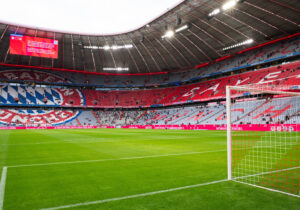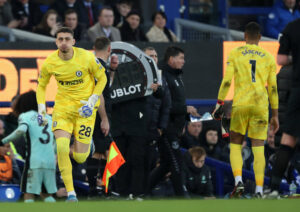Footballers have short careers. When many reach their 30’s, they can often be considered past their best. Players often sign their first professional contracts as teenagers and by the time they are in their 20’s, they can be classed as experienced. However, there have been occasions when who we now know as Premier League greats didn’t make it in the game until they were well into adulthood.
Here is a look at five strikers who were late bloomers in the game but recognised as greats by the clubs they played for and by fans in general.
Premier League Greats Who Left it Late
Ole Gunnar Solskjaer
The ultimate super-sub, Ole Gunnar Solskjaer had a highly successful playing career, winning multiple trophies and accolades. However, he was also a late starter, especially in top-flight football. In his native Norway, the baby-faced assassin did not feature in their top division until he was 22-years-old.
Following 41 goals in 54 games for Molde, Solskjaer made a dream move to Manchester United. Expected to be no more than a back-up striker, the then-unknown made an instant impression on all at Old Trafford and the Premier League. At £1.5 million, he would soon become regarded as a bargain buy.
The Norwegian hitman was a major part of United’s glory days of the late ’90s and early 2000s. In his ten years at the club, Solskjaer would win 12 trophies, including six Premier League titles. After 126 goals, Solskjaer had legend status, especially due to his knack for coming off the bench and scoring at important times. Premier League greats don’t need to start every game, as Solskjaer proved.
Despite not being in the Premier League, the one goal that will forever live in the memories of United fans, and fans of the game in general, was his goal in the Champions League final. With the Red Devils trailing to Bayern Munich in the 90th minute, an equaliser was forced and it looked like the game would head to extra time. On 92 minutes, though, the super-sub did what he did best and scored the all-important winner to secure a historic treble for his team and cement his place in United folklore.
Jamie Vardy
At 24, one of the Premier League’s most prolific strikers was still playing in England’s seventh tier. Few would have believed that just a few years later, Vardy would be lifting the Premier League title, and not with one of the usual suspects, but the unfancied Leicester City.
Vardy began showing his goalscoring prowess, albeit in the lower leagues, while at FC Halifax Town and Fleetwood Town. His 34 goals in 42 games for Fleetwood prompted Leicester to take a chance on the striker. A reported fee of £1 million took Vardy from non-league football to the Championship with the Foxes. Two seasons later, his Premier League journey had begun.
Leicester’s first season back was difficult, with the club just about managing to avoid relegation. Their second season was one that no one would have predicted, with Vardy instrumental. The Foxes and Vardy defied all the odds to lift the Premier League title, and he would score 24 league goals and break the Premier League record for scoring in consecutive games.
Following the title win, he has continued to be a threat to any Premier League, Football League, or European defence. Since arriving in England’s top flight at 27-years-old, 115 goals have come from the lethal feet of Jamie Vardy. Be it tap-in or the spectacular, Vardy has scored them all. Now 34, the former England forward is still scoring regularly in the top flight for Leicester as the club and their top striker battle at the top of the table.
Scotland legend Ally McCoist places Jamie Vardy ahead of another Premier League great Didier Drogba. McCoist told Talksport: “What Vardy has achieved and where he was at the early stages of his career at 19, 20, 21, 22 – I just think it’s amazing where he was playing and the goals he was scoring. And then all of a sudden, what nine or ten years later he’s been an England international and part of the Premier League 100 club.
“I know it’s an incredible thing to say, but I’d probably go for Vardy [over Drogba] just because of what he’s achieved and where he was.”
Kevin Philips
Deemed too small to be a striker at Southampton, the Saints attempted to make a future Premier League Golden Boot winner into a right-back. Following his release, a spell in non-league football and then Watford led to a move to Sunderland. His first two seasons on Wearside were in the Championship. However, Phillips would give the Premier League a look at what was in store for them once he was there. He broke Sunderland’s post-war goalscoring record with 35 goals in his first season and the second brought another 25 despite being injured for several months.
Many wondered whether Phillips would be able to replicate his form from the Championship in the Premier League. Any doubters were soon watching in awe as Phillips, alongside the experienced Niall Quinn, terrorised some of the best defences in world football. A 30-goal season saw Phillips win not only the Premier League Golden Boot but also the European Golden Shoe for being the top scorer throughout Europe. He is still the last English player to win the award.
Goals would continue to come Phillips’ way at Sunderland until leaving in 2003 for Southampton. Two seasons on the south coast brought double figures in each before a move to Aston Villa saw the England marksman endure a difficult time. In his later years as a footballer, Phillips continued to grace the Premier League from time to time, usually following shooting the likes of Birmingham City, West Bromwich Albion and Crystal Palace to the top tier of the English game.
Didier Drogba
Didier Drogba is considered amongst the finest strikers to have graced the Premier League, especially by Chelsea fans. However, if there was a player who fits the late bloomer tag perfectly, it’s Didier Drogba.
The now-retired Ivory Coast hitman did not sign his first professional contract until he was 21-years-old and when he arrived at Chelsea for £24 million at the age of 26, he had just one season at a ‘top’ club in Marseille. That one season brought 32 goals and Chelsea believed it was a gamble worth taking.
His first season brought the Blues’ first league title in 50 years plus the League Cup. Another league title in his second season followed, however, Drogba had still not hit his stride despite 16 goals in each of his first two seasons. In his third season, fans saw the best of him.
Although the league title eluded the Blues, Drogba scored twice to secure the League Cup and scored the only goal in the FA Cup final. He won the African Footballer of the Year, the Golden Boot following 20 Premier League goals, 33 in all competitions, and was named in the PFA Premier League Team of the Year.
Drogba continued to score goals regularly and win trophies and accolades, especially in 2009/10 as his 37 goals in 44 games helped Chelsea win a league and cup double. Another Golden Boot was also won. The following two seasons saw the striker reach 100 Premier League goals and 157 in all competitions since his arrival in England to cement his place in any discussion about Premier League greats. He left the club in 2012 for the Chinese Super League. However, he returned two years later for one final season at Stamford Bridge.
In November 2012, Drogba was named Chelsea’s greatest ever player in a poll of 20,000 fans conducted by Chelsea Magazine.
Ian Wright
Arsenal legend Ian Wright almost gave up on football at the age of 22 following failed trials at Brighton & Hove Albion and Southend United. Luckily for Wright, Crystal Palace gave him a chance. At 26-years-old, Ian Wright graced the top flight of English football for the first time.
Following 118 goals for Palace, he signed for Arsenal at the age of 28 for £2.5 million in 1991. A hat-trick on his league debut for the Gunners at Southampton gave everyone a glimpse of what was in store for Wright and Arsenal.
Wright would go on to be the Gunners’ top-scorer for six seasons in a row. While at Highbury, Wright would win the Premier League once, the FA Cup twice, the League Cup, and the European Cup Winners Cup. During his final season with Arsenal, Wright would beat Cliff Bastin’s club record of 178 goals to become not only Arsenal’s all-time top scorer but one of the Premier League greats. He finished his Arsenal career on 185 goals, with 128 coming in the Premier League.
Following his departure from Arsenal, Wright moved to West Ham United where he continued to score Premier League goals until his departure in 2000. The England international ended his career with 324 goals to his name in all competitions.
Main Photo






